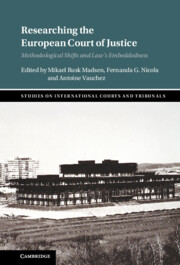Book contents
- Researching the European Court of Justice
- Studies on International Courts and Tribunals
- Researching the European Court of Justice
- Copyright page
- Contents
- Notes on Contributors
- 1 From Methodological Shifts to EU Law’s Embeddedness
- Part I Cases
- Part II Judicial Frames
- Part III Socio-legal Practices
- 10 The Genesis of the Institution within the Institution
- 11 Reconstructing the Construction of Laval
- 12 Judicially-backed Mutation
- 13 Media Attention for CJEU Case Law
- 14 Conclusion: Embedding Decoloniality in Empirical EU Studies
- Index
11 - Reconstructing the Construction of Laval
Studying EU Law as a Social Interpretive Process
from Part III - Socio-legal Practices
Published online by Cambridge University Press: 05 May 2022
- Researching the European Court of Justice
- Studies on International Courts and Tribunals
- Researching the European Court of Justice
- Copyright page
- Contents
- Notes on Contributors
- 1 From Methodological Shifts to EU Law’s Embeddedness
- Part I Cases
- Part II Judicial Frames
- Part III Socio-legal Practices
- 10 The Genesis of the Institution within the Institution
- 11 Reconstructing the Construction of Laval
- 12 Judicially-backed Mutation
- 13 Media Attention for CJEU Case Law
- 14 Conclusion: Embedding Decoloniality in Empirical EU Studies
- Index
Summary
This chapter on the Re-constructing the construction of Laval: Studying EU law as a social interpretive process focuses on one of the most controversial ECJ rulings in recent decades. Trying to understand how this particular ruling became so controversial, this chapter presents an analytical approach that views the construction of EU law as an interpretive process, which concerns not only the meaning of a specific ruling, but also its importance in terms of setting crucial precedence and in terms of having impact on European society. The chapter argues that to understand how Laval became so important, we must study the case as a protracted process of social, legal and political construction, in which a diverse set of actors – such as lawyers, legal scholars, politicians and trade unionist – all contributed to enchanting the case’s significance both before and after the ruling itself. Tracing this interpretive process, the chapter shows how the political context (of EU enlargement and Services Directive) and the legal context (of other somewhat related rulings) were knitted together to make Laval a symbolic stake in a struggle regarding the future of the European Union. Doing so, the chapter illustrates how a methodological approach which centers less on the ruling itself, but more on its social and political construction, can shed new light on how EU law is created. At the same time, the chapter takes the study of the Laval case as an opportunity to discuss the underlying principles of this processual approach, the challenges of its practical implementation and its limitations.
- Type
- Chapter
- Information
- Researching the European Court of JusticeMethodological Shifts and Law's Embeddedness, pp. 261 - 285Publisher: Cambridge University PressPrint publication year: 2022



